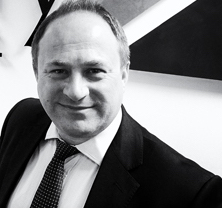LEADERSHIP VISION
Today GoPro Markets is an established corporate and private client brokerage, but what was your original vision for the firm?
The new millennium brought increasing back office automation, the dismantling of the Glass-Steagall Act and a fall in interest rates. The banks and inter-dealer brokers moved into the mid-market as part of a macro strategy of volume consolidation.
At the same time, the demand for advanced electronic trading platforms, supported by complex, new, and often proprietary, technology, made many smaller firms willing targets for acquisition.
These, and other factors, combined to eliminate the mid-market as a coherent sector.
But following the financial crisis, these conditions largely reversed. Regulatory, capital and compliance changes increased operating complexity, risk and cost. Standardised, widely available technology reduced barriers to entry.
As a result, we’ve seen a retreat from mid-market products and services, leaving a gap for clients who are no longer natural customers of the institutional firms, but need a more sophisticated service than mono-line retail firms can accommodate.
As a specialist mid-market broker, GoPro Markets was established to meet this anticipated need.
What makes GoPro Markets different?
The corporate broking market is going through a period of rapid and meaningful change. Change demands a fresh perspective. There are few, if any, brokers offering our range of products and services. We’re a traditional broker. Our business is built on market access and quality of execution, providing clients with the full range of cash and derivative products.
Our desk and execution teams are hugely experienced. They offer outstanding product and market knowledge. Execution is delivered through market-standard trading platforms, Bloomberg or via voice execution directly with the desks.
We are non-conflicted; we don’t engage in proprietary trading or market making, and have no potential conflict with our clients’ interests. This is not the result of regulatory change, it simply reflects our core values.
We’ve listened and responded to our clients’ needs. Our service is flexible; developing bespoke solutions to meet their specific requirements.
As the industry consolidates, who do you consider your main competitors?
Today, I see no clear direct competitors – in contrast with the retail and investment banking sectors, which are well defined and serviced.
We believe consolidation will continue in these sectors, and will be relentless. The mid-market was pretty much eliminated through acquisition. Now it’s expanding as clients demand it. We see this trend across all financial markets, not just in brokering.
Technology is now a facilitator not a barrier. There are business areas open to mid-size firms that weren’t possible a few years ago. However, for us, technology is just a tool. It’s critical of course, but it’s something that sits alongside client service, governance values, and top quality execution. Many financial firms have evolved into fintech firms. They often lack the people and the client service skills we nurture.
The bulk of our business is voice brokered. We provide clients with the trading platforms they require, but these are increasingly commoditised.
What’s important is time. Time is a precious commodity for many of our clients. They have priorities other than micro-managing their investments. So, they find it more valuable and convenient to use our services than being stuck in front of a screen.
What does your client base look like?
Our typical clients are those who require a range of services and products not generally provided by the retail sector, while seeking a level of client service and attention that they’re finding increasingly difficult to obtain from the larger tier I brokers and institutional firms.
We’re a traditional relationship broker. Personal relationship-building is paramount to our business model. Our new clients come mostly through the work of our sales and execution staff. And as our business has developed, and our name has become more widely known, the proportion of referrals and direct approaches has increased.
What are your future plans?
In common with most firms, the short-term goal is to successfully incorporate the evolving regulatory environment.
Medium-term, our strategy is to deliver growth while remaining client-driven and focused. We need to respond well to the new market environment, and to develop the resulting services our clients demand.
I’ve no doubt that in the mid-market, we’ll take a primary role providing these emerging niche services. Clients’ platform needs are increasingly commoditised, so our platform-neutral strategy serves us well. Clearing services are becoming increasingly fragmented, so we’ll have a growing role in aggregating clearing services from multiple providers. And we continually develop our post-trade service technology. Clients increasingly require automated, seamless data services.
It’s difficult to predict precisely how change over the coming years will play out, but the successful business in our space will always be adaptable.
Paul Heber, Chief Executive Officer, GoPro Markets


